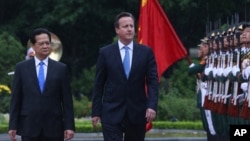British Prime Minister David Cameron said Vietnam is at a turning point, having slashed poverty and grown its economy, but to move to the next stage of development it must tackle corruption.
Commerce and corruption were the themes of Cameron’s tour of Indonesia, Singapore, Vietnam, and Malaysia this week, even as observers asked why he met with politicians with questionable track records.
“When we talk [it’s] about some of the difficult stuff, how we tackle corruption, how we ensure business integrity, how we have fair rules,” Cameron told a business forum in Ho Chi Minh City. “I’m absolutely certain it’s getting those things right that will make sure Vietnam is as successful in the next decade as it has been in the last decade.”
Cameron thanked Nguyen Xuan Phuc for his candor after the Vietnamese deputy prime minister said, “We have to say no to corruption in the public and private sector.”
Corporate governance
Speakers at the business forum said Vietnam needs good corporate governance, a level playing field for foreign and domestic firms, and integrity in both government and business.
Britain is not immune either, as it is now reacting to the resignation of a politician who took cocaine with prostitutes. On the corporate side, British drugmaker GlaxoSmithKline became the global face of corporate corruption after China arrested its executives for bribery in 2013.
In Vietnam, graft is an everyday part of business, with people paying fees to do everything from expediting a permit to securing a new job.
Milton Lawson, managing partner at the law firm Freshfields Bruckhaus Deringer, pointed to a Transparency International report which ranks in Vietnam at 119 on a list of 175 countries for corruption perceptions.
“More importantly the report said, in terms of the score Vietnam had, it had remained the same for three consecutive years,” Lawson said.
In response to a question from Cameron, who moderated the forum, Lawson said Vietnamese courts leave “quite a bit to be desired” and there are “relatively few enforcements of foreign arbitrations.”
Multi-nation tour
Corruption has graced more headlines about Cameron’s stop in Malaysia, where Prime Minister Najib Razak is accused of funneling millions from a state investment fund to his personal accounts. Fraud was a problem long before Najib’s term, but his reaction to the accusations has been more severe, including sacking officials and muzzling the press.
By contrast, Cameron told Vietnam it should look to Singapore as a model where clean governance has attracted investors.
“Singapore has one of the least corrupt governments and businesses anywhere in the world,” he said. “It’s just a natural stopping off point for businesses around the world. There are thousands of British businesses that choose to make Singapore their home in Southeast Asia and I think that speaks volumes.”
Singapore comes in at No. 7 on the corruption perceptions index and Malaysia at 50. In Singapore, bribery is rare and daily bureaucracy functions well for investors.
But at the top level, the Singapore People's Party has a monopoly on power and brooks little criticism. This month Prime Minister Lee Hsien Loong spent hours testifying against a blogger he successfully sued for defamation.
Investors come to Singapore for its low taxes and minimal red tape, but these also have made it a magnet for tax avoidance, according to the Tax Justice Network.
Malaysian and Singaporean leaders historically justified their rule as governing with “Asian values,” an ideology that stresses strong central control, stability, and communal welfare.
But at the Vietnamese business forum, World Bank country director Victoria Kwakwa said it’s “irrelevant” to distinguish between Asian nations and everyone else when establishing governance or business standards.
She said the recent trend has been a “convergence” of beliefs that economies are driven by the private sector, not the state, and that corruption is bad for business.
“The world is moving toward the same principles,” Kwakwa said.




